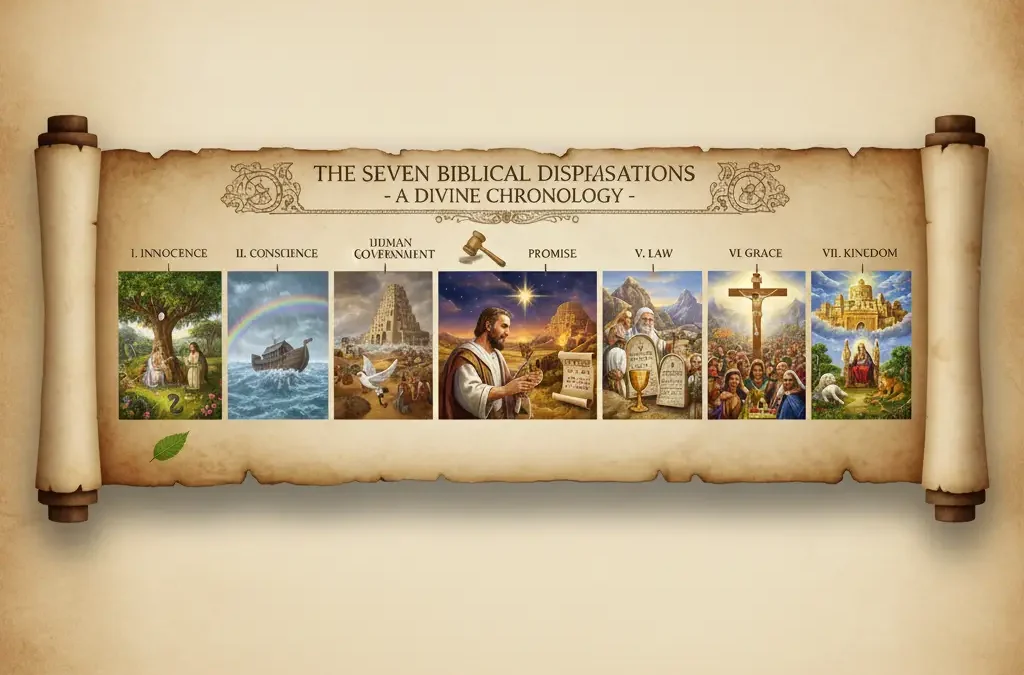Many Christians hear the term dispensation in sermons or prophecy studies but wonder: Is that word actually in the Bible? The short answer is yes — the word dispensation appears several times in the New Testament, particularly in Paul’s epistles. Let’s explore where it’s found, what it means, and how it helps us understand God’s plan throughout history.
Where the Word “Dispensation” Appears in Scripture
The word dispensation (Greek: οἰκονομία — oikonomia) appears four times in the King James Version (KJV). It is translated from a Greek term meaning administration, stewardship, or management of a household. Let’s look at each instance:
- 1 Corinthians 9:17 (KJV)
“For if I do this thing willingly, I have a reward: but if against my will, a dispensation of the gospel is committed unto me.”
Context: Paul refers to his divine commission to preach the Gospel. Here, dispensation means a stewardship entrusted to him — God’s management of His message through Paul. - Ephesians 1:10 (KJV)
“That in the dispensation of the fulness of times he might gather together in one all things in Christ, both which are in heaven, and which are on earth; even in him.”
Context: This looks forward to the future administration under Christ’s rule — the millennial kingdom when God’s redemptive plan reaches completion. - Ephesians 3:2 (KJV)
“If ye have heard of the dispensation of the grace of God which is given me to you-ward.”
Context: Paul speaks of the present age of grace, a distinct administration in which salvation is offered to all through faith in Christ apart from the law. - Colossians 1:25 (KJV)
“Whereof I am made a minister, according to the dispensation of God which is given to me for you, to fulfil the word of God.”
Context: Again, Paul emphasizes his divine role as a steward of a specific revelation — the mystery of Christ and the Church.
Meaning and Origin of the Word “Dispensation”
- Greek Word: Oikonomia (οἰκονομία)
- Literal Meaning: “house law,” “house management,” or “administration of a household.”
- Derived From: Oikos (house) + Nomos (law).
- Modern Definition: A period of time during which God administers His plan in a particular way — revealing certain responsibilities, tests, and truths to humanity.
In other translations, the same Greek word is often rendered as administration (NASB, ESV) or stewardship (NIV), but the concept remains: God governs His relationship with mankind through distinct, progressive arrangements.
The Seven Classic Dispensations
Bible scholars, particularly those in the Dispensationalist tradition (popularized by C. I. Scofield and Clarence Larkin), identify seven distinct dispensations in Scripture. Each represents a different divine administration or period in God’s plan for humanity:
| # | Dispensation | Time Period | Human Responsibility | Result / Judgment |
|---|---|---|---|---|
| 1 | Innocence | Creation to the Fall (Genesis 1–3) | Obey God; do not eat from the Tree of Knowledge | Expulsion from Eden |
| 2 | Conscience | Adam to Noah (Genesis 4–8) | Do right according to conscience | The Flood |
| 3 | Human Government | Noah to Abraham (Genesis 9–11) | Multiply and govern righteously | Confusion at Babel |
| 4 | Promise | Abraham to Moses (Genesis 12–Exodus 19) | Dwell in faith on God’s promises | Bondage in Egypt |
| 5 | Law | Moses to Christ (Exodus 20–John 19) | Obey the Law of Moses | The Cross / Dispersion of Israel |
| 6 | Grace (Church Age) | Pentecost to the Rapture (Acts 2–Revelation 3) | Believe in Christ; live by faith | The Rapture ends this dispensation |
| 7 | Kingdom (Millennial Reign) | Christ’s Second Coming to the New Heaven & Earth | Obey King Jesus | Final rebellion and Great White Throne Judgment |
Why Dispensations Matter
Understanding dispensations helps believers recognize the progressive unfolding of God’s revelation. It clarifies why God gave different commands in different times — for example, why Adam was told not to eat fruit, Moses was given the Law, and Christians today live under grace, not the Law.
Dispensationalism emphasizes that while God’s character never changes, His methods of administration and human responsibilities can differ across ages.
Is It Fair to Say That “God Is a Dispensationalist”?
In a sense, yes. The Bible clearly shows that God has dealt with mankind in different ways at different times — not because His nature changes, but because His plan unfolds in stages. He is the ultimate “household manager” (Ephesians 1:10), wisely administering His redemptive purposes through history.
As Charles Ryrie wrote:
“A dispensation is a distinguishable economy in the outworking of God’s purpose.”
Therefore, to say “God is a Dispensationalist” is not to impose a system upon Scripture but to acknowledge what Scripture already reveals — that God administers His plan for humanity in organized, progressive stages, culminating in the eternal reign of Christ.
Conclusion
The word dispensation may not appear frequently, but its theological significance is profound. From Adam to Christ and beyond, God has governed humanity through successive administrations — each revealing His justice, mercy, and ultimate plan of redemption.
Recognizing the dispensations helps us interpret Scripture accurately, understand prophecy clearly, and see the unity of God’s grand design from Genesis to Revelation.
A Bible Prophecy Site Like No Other
Join Those 'Counted Worthy to Escape'
The Rapture Will Happen in the Twinkling of an Eye
The Living Word ... The Holy Bible
You can't own too many Bibles. Make a gift of the Best Selling Book in the History of the World. Share the Truth, The Life, and the Way.
Not sure where to begin? Then take a quick look at our guide for 'How to Choose a Bible'
As an Amazon Associate we earn from qualifying purchases. If you choose to buy through our affiliate links, we may receive a small commission at no extra cost to you. These earnings help support the ministry and the continued growth of PreTribulation.com. Learn about more about how you can support this ministry project here. Thank you for your support, and God Bless YOU.










